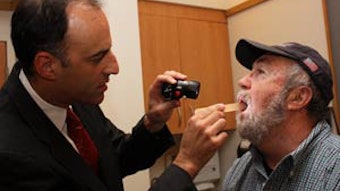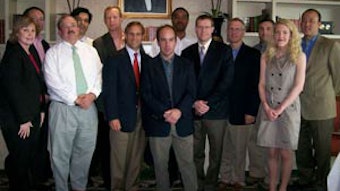What is MedPAC?
Tricia Bardon Assistant Director, Health Policy The Medicare Payment Advisory Commission (MedPAC) is an independent Congressional agency established by the Balanced Budget Act of 1997 to advise the U.S. Congress on issues affecting the Medicare program. The commission’s statutory mandate is quite broad. In addition to advising the Congress on payments to private health plans participating in Medicare and providers in Medicare’s traditional fee-for-service program, MedPAC is also tasked with analyzing access to care, quality of care, and other issues affecting Medicare. The commission’s 17 members bring diverse expertise in the financing and delivery of healthcare services. Commissioners are appointed to three-year terms (subject to renewal) by the Comptroller General and serve part time. Commissioners appointments are staggered; the terms of five or six commissioners expire each year. To view the backgrounds of current appointees, please visit http://www.medpac.gov/meetings.cfm. The commission is supported by an executive director and a staff of analysts, who typically have backgrounds in economics, health policy, public health, or medicine. MedPAC meets publicly to discuss policy issues and formulate its recommendations to Congress. In the course of these meetings, commissioners consider the results of staff research, presentations by policy experts, and comments from interested parties such as specialty societies like the Academy. Commission members and staff also seek input on Medicare issues through frequent meetings with individuals interested in the program, including staff from congressional committees and the Centers for Medicare & Medicaid Services (CMS), healthcare researchers, healthcare providers, and beneficiary advocates. Two reports (issued in March and June each year) are the primary outlet for commission recommendations. In addition to these reports and others on subjects requested by Congress, MedPAC advises the Congress through other avenues, including comments on reports and proposed regulations issued by the Secretary of the Department of Health and Human Services, testimony, and briefings for congressional staff1. Each year, the commission recommends pay increases or cuts for all parts of Medicare. On March 14, 2011, for fiscal year 2012, MedPAC recommended a 1 percent increase to the Medicare Physician Fee Schedule (MPFS). This potential increase to the MPFS might be difficult to accomplish as Congress continues to quarrel over federal spending levels. MedPAC’s recommendations are designed to maintain enough cost pressure to encourage efficiency, while limiting out-of-pocket costs for Medicare beneficiaries. Although Congress does not always accept MedPAC’s recommendations, the commission’s proposals play a vital role in the Congress’ budgetary discussions and considerations. The Academy attends MedPAC meetings that are relevant to otolaryngology—head and neck surgery, paying close attention to agenda items and recommendations that could impact members. Academy staff may also attend meetings with members who are experienced in payment policies and can offer expert testimonies. As MedPAC staff provide recommendations for future changes to the Medicare program, it is important for Academy staff to follow this organization closely to ensure we fully understand the changing healthcare environment. This enables the Academy to communicate future changes in Medicare payment to members and can impact the direction of our advocacy strategic initiatives. Last year, the commission discussed several options to reduce the growth of in-office ancillary services (IOAS), such as advanced imaging services, because it felt that these services were a main catalyst for increasing healthcare costs. Generally, although the Stark law prohibits physicians from self-referring patients for services, it does not apply to certain services such as advanced imaging. The options that the commission proposed to reduce the growth of IOAS included requiring prior authorizations for self-referred imaging services performed in physician’s offices, removing imaging services from the IOAS exception, reducing payment rates for in-office imaging services, etc. After Academy staff and the Imaging Committee analyzed these options and their potential impact on the specialty, we determined that if implemented they would pose significant access to care problems for Medicare patients. As a result, the Academy collaborated with other specialty societies and sent a letter opposing these options. In its June report, MedPAC recommended these options to Congress. Academy staff continues to track this issue and advocate for members as well as monitor MedPAC meetings for other potentially problematic proposals that may negatively impact otolaryngologists’ abilities to provide high quality care to patients. During the April 2011 MedPAC meeting, there was a discussion titled, “Improving the accuracy of payments to physicians and other health professionals.” It involved MedPAC’s desire to find alternative approaches to valuing physician payment. From this meeting, MedPAC staff was asked to review hospital operating room logs to accurately measure and designate physician time allotted to office procedures. Doing this might impact the current Medicare system, which uses the Resource-Based Relative Value Scale (RBRVS). Such discussions, though not exclusive to otolaryngologist—head and neck surgeons are certainly important to all medical specialties. If you have any further questions on MedPAC or would like to obtain meeting transcripts, please visit http://www.medpac.gov/meetings.cfm or contact healthpolicy@entnet.org. To obtain updates on the Academy’s regulatory advocacy endeavors, visit http://www.entnet.org/Practice/CMS-News.cfm. We encourage members to write us with relevant topics of interest in health policy and practice management. Please email us at healthpolicy@entnet.org. *About MedPAC page. Medicare Payment Advisory Commisssion website. Available at http://www.medpac.gov/about.cfm. Accessed May 23, 2011.
The Medicare Payment Advisory Commission (MedPAC) is an independent Congressional agency established by the Balanced Budget Act of 1997 to advise the U.S. Congress on issues affecting the Medicare program. The commission’s statutory mandate is quite broad. In addition to advising the Congress on payments to private health plans participating in Medicare and providers in Medicare’s traditional fee-for-service program, MedPAC is also tasked with analyzing access to care, quality of care, and other issues affecting Medicare.
The commission’s 17 members bring diverse expertise in the financing and delivery of healthcare services. Commissioners are appointed to three-year terms (subject to renewal) by the Comptroller General and serve part time. Commissioners appointments are staggered; the terms of five or six commissioners expire each year. To view the backgrounds of current appointees, please visit http://www.medpac.gov/meetings.cfm. The commission is supported by an executive director and a staff of analysts, who typically have backgrounds in economics, health policy, public health, or medicine.
MedPAC meets publicly to discuss policy issues and formulate its recommendations to Congress. In the course of these meetings, commissioners consider the results of staff research, presentations by policy experts, and comments from interested parties such as specialty societies like the Academy. Commission members and staff also seek input on Medicare issues through frequent meetings with individuals interested in the program, including staff from congressional committees and the Centers for Medicare & Medicaid Services (CMS), healthcare researchers, healthcare providers, and beneficiary advocates.
Two reports (issued in March and June each year) are the primary outlet for commission recommendations. In addition to these reports and others on subjects requested by Congress, MedPAC advises the Congress through other avenues, including comments on reports and proposed regulations issued by the Secretary of the Department of Health and Human Services, testimony, and briefings for congressional staff1.
Each year, the commission recommends pay increases or cuts for all parts of Medicare. On March 14, 2011, for fiscal year 2012, MedPAC recommended a 1 percent increase to the Medicare Physician Fee Schedule (MPFS). This potential increase to the MPFS might be difficult to accomplish as Congress continues to quarrel over federal spending levels. MedPAC’s recommendations are designed to maintain enough cost pressure to encourage efficiency, while limiting out-of-pocket costs for Medicare beneficiaries. Although Congress does not always accept MedPAC’s recommendations, the commission’s proposals play a vital role in the Congress’ budgetary discussions and considerations.
The Academy attends MedPAC meetings that are relevant to otolaryngology—head and neck surgery, paying close attention to agenda items and recommendations that could impact members. Academy staff may also attend meetings with members who are experienced in payment policies and can offer expert testimonies. As MedPAC staff provide recommendations for future changes to the Medicare program, it is important for Academy staff to follow this organization closely to ensure we fully understand the changing healthcare environment. This enables the Academy to communicate future changes in Medicare payment to members and can impact the direction of our advocacy strategic initiatives.
Last year, the commission discussed several options to reduce the growth of in-office ancillary services (IOAS), such as advanced imaging services, because it felt that these services were a main catalyst for increasing healthcare costs. Generally, although the Stark law prohibits physicians from self-referring patients for services, it does not apply to certain services such as advanced imaging. The options that the commission proposed to reduce the growth of IOAS included requiring prior authorizations for self-referred imaging services performed in physician’s offices, removing imaging services from the IOAS exception, reducing payment rates for in-office imaging services, etc. After Academy staff and the Imaging Committee analyzed these options and their potential impact on the specialty, we determined that if implemented they would pose significant access to care problems for Medicare patients. As a result, the Academy collaborated with other specialty societies and sent a letter opposing these options. In its June report, MedPAC recommended these options to Congress. Academy staff continues to track this issue and advocate for members as well as monitor MedPAC meetings for other potentially problematic proposals that may negatively impact otolaryngologists’ abilities to provide high quality care to patients.
During the April 2011 MedPAC meeting, there was a discussion titled, “Improving the accuracy of payments to physicians and other health professionals.” It involved MedPAC’s desire to find alternative approaches to valuing physician payment. From this meeting, MedPAC staff was asked to review hospital operating room logs to accurately measure and designate physician time allotted to office procedures. Doing this might impact the current Medicare system, which uses the Resource-Based Relative Value Scale (RBRVS). Such discussions, though not exclusive to otolaryngologist—head and neck surgeons are certainly important to all medical specialties.
If you have any further questions on MedPAC or would like to obtain meeting transcripts, please visit http://www.medpac.gov/meetings.cfm or contact healthpolicy@entnet.org. To obtain updates on the Academy’s regulatory advocacy endeavors, visit http://www.entnet.org/Practice/CMS-News.cfm.
We encourage members to write us with relevant topics of interest in health policy and practice management. Please email us at healthpolicy@entnet.org.
*About MedPAC page. Medicare Payment Advisory Commisssion website. Available at http://www.medpac.gov/about.cfm. Accessed May 23, 2011.












